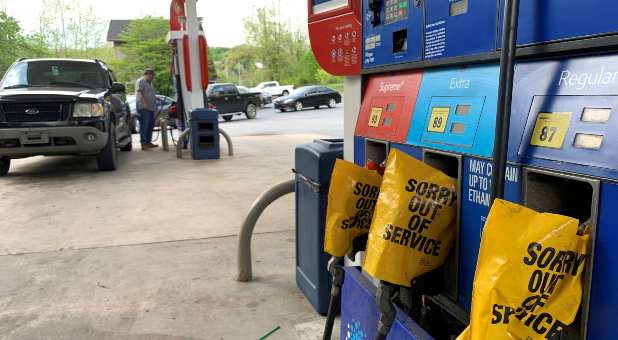Colonial Pipeline Restarts; Lingering Questions Remain About Biden Energy, Cybersecurity Policies
Amid panicking motorists, long lines at gas stations, empty fuel pumps and skyrocketing gasoline prices, Colonial Pipeline announced the resumption of operations Wednesday evening. But the lockdown that resulted from a cyberattack on the pipeline, which delivers nearly half the fuel consumed on the East Coast, has left some with deep misgivings about both the Biden administration’s energy policies and the need for heightened U.S. cybersecurity.
House GOP leader Kevin McCarthy and other Republicans tied the problem to the Biden administration’s cancellation of the Keystone Pipeline project:
The Colonial Pipeline crisis shows that we need more American energy to fuel our economy, not less.
But the Biden Administration has already canceled the Keystone Pipeline and paused oil and gas drilling, leaving our energy supply more vulnerable to attacks.
— Kevin McCarthy (@GOPLeader) May 11, 2021
Rep. August Pfluger, R-Texas, a former national security adviser to former President Donald Trump, told Fox News, “We’re going to do everything we can to continue to fight for things like energy independence. … It is job No. 1 for me that we fight against anything that we see from a Biden administration or executive order.”
Many believe the problem stretches past energy concerns or even the single attack on Colonial. “These types of ransomware attacks are indicative of a much larger national security risk to our nation’s infrastructure, and the importance of strong presidential leadership,” Rep. Madison Cawthorne, R-N.C., said. “The Biden administration must finally step up and acknowledge that their weak stance on Russia has real-world consequences.”
Sen. James Lankford, R-Okla., also expressed concerns about cybersecurity:
Just this week we’ve seen another ransomware attack that is currently impacting millions of Americans.
We have systems in place to respond to attacks but nothing to prevent them. We need to stop attacks before they happen. pic.twitter.com/HV1xmJOtD2
— Sen. James Lankford (@SenatorLankford) May 11, 2021
Energy expert Jonathan Monken agrees. “This should be a wake-up call,” he told The New York Times. “When you look at what’s most likely to cause disruptions to energy companies today, I think you have to put cybersecurity risks at the top.”
A statement from Richard Glick, chairman of the Federal Energy Regulatory Commission addressed the cybersecurity issue as well, calling the attack against the Colonial system “a stark reminder that we must do more to ensure the safety of our nation’s energy infrastructure” and pointing to the need for a system of mandatory cybersecurity standards for “the nearly 3 million miles of natural gas, oil, and hazardous liquid pipelines that traverse the United States.”
As the pipeline reopened, the Biden administration lifted a century-old U.S. shipping mandate known as the Jones Act, allowing a foreign tanker to deliver gasoline and diesel to areas of the country affected by the Colonial outage, per Bloomberg News. In addition, President Biden signed a Wednesday executive order designed to “chart a new course to improve the nation’s cybersecurity,” the White House reports. He plans to address the nation today to discuss the attack on the Pipeline and is scheduled to meet with six Republican senators today in an attempt to continue building support for his $2 trillion infrastructure package, per the Washington Post. {eoa}
Follow breaking news like this and more in our new platform, CHARISMA PLUS















































